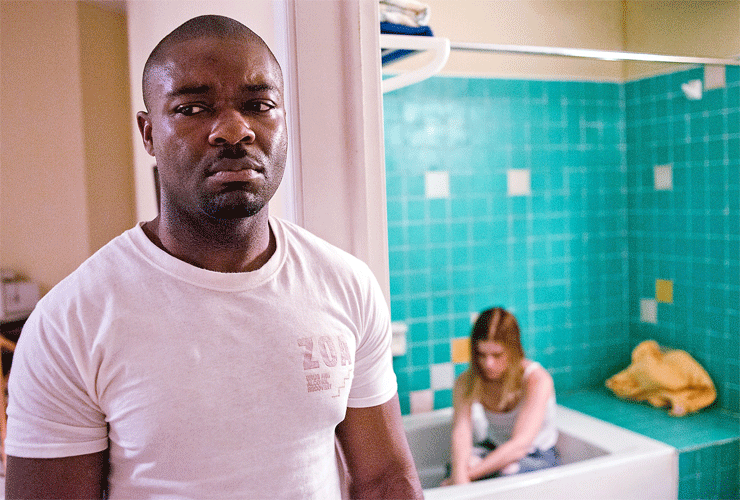
David Oyelowo and Kate Mara in a scene from Captive.
He sits at the round table, all poise and elegance in a gray suit and white shirt, as reporters take their seats.
“I won't bite; it's OK,” he beckons, a smooth, disarming icebreaker capped with a smile that enhances his close-trimmed beard.
David Oyelowo is so relaxed on this September afternoon, it's hard to believe he's been fielding questions from multiple South Florida media outlets all day long.
The Sept. 18 to 20 weekend is a big one for this English actor of Nigerian descent who wowed moviegoers earlier this year as Dr. Martin Luther King Jr. in Ava DuVernay's stirring biopic Selma. Sunday night, he's up for an Emmy for his portrayal of Peter Snowden, a mentally unstable war vet, in the HBO film Nightingale.
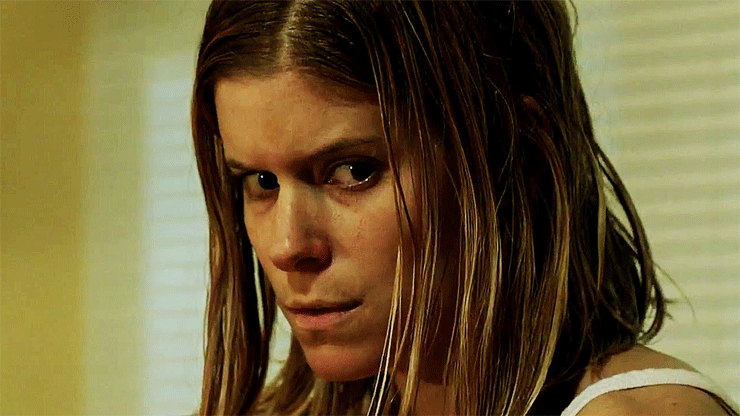
Kate Mara in a scene from Captive.
But that's not what brings the Oxford native, 39, to the Mandarin Oriental on Brickell Key. Rather, it's Captive, the big-screen dramatization of the March 2005 abduction of Atlanta-area resident Ashley Smith by convicted rapist Brian Nichols, that's up front and center on the renowned stage and screen star's mind. Adapted from Smith's book about her ordeal and starring Oyelowo as Nichols, the Paramount Pictures release is being regarded as the studio's bid to court a Christian viewership. In fact, Rick Warren's spiritually inclined best-seller The Purpose Driven Life figures prominently in the film's narrative. (In customary faith-based movie tradition, it was not screened for critics prior to its Sept. 18 opening date.)
Oyelowo, however, stresses that the project, in which he pulls double duty as one of its producers, was never meant to appeal solely to the Left Behind crowd. “It's a story that could very easily be given a movie-of-the-week treatment, or for the faith side of things to be very preachy, and I wasn't really interested in that version of the film,” he says, his lilting tenor a balm for the most jaded entertainment journalist.
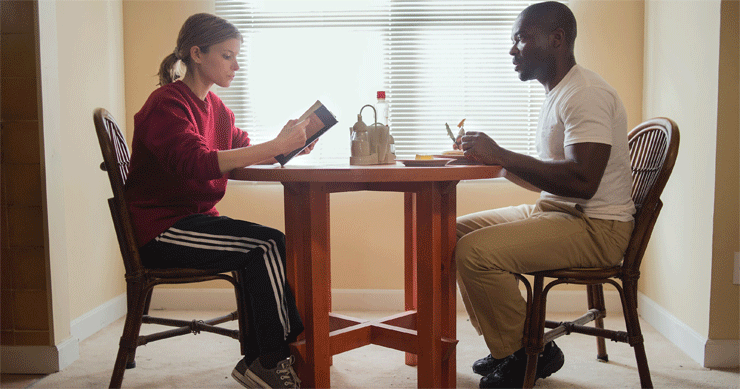
Kate Mara and David Oyelowo in a scene from Captive.
Captive is first and foremost a portrait of two people who could be perceived as lost souls connecting under the unlikeliest conditions. “What's really amazing about the story is the fact that this was a murderer and a meth addict who are holed up together in an apartment for seven hours,” says Oyelowo, referring to Smith's long battle with meth addiction, which resulted in her losing custody of her daughter.
To play Smith, Oyelowo fought to ensure his friend and colleague Kate Mara (127 Hours, the Netflix series House of Cards), whom he had directed in a short film several years before collaborating on Captive, was cast in the demanding role. “I was adamant that she was the one to play Ashley Smith, partly because she's an actress who we haven't yet seen how far deep and wide her talent goes,” he says.
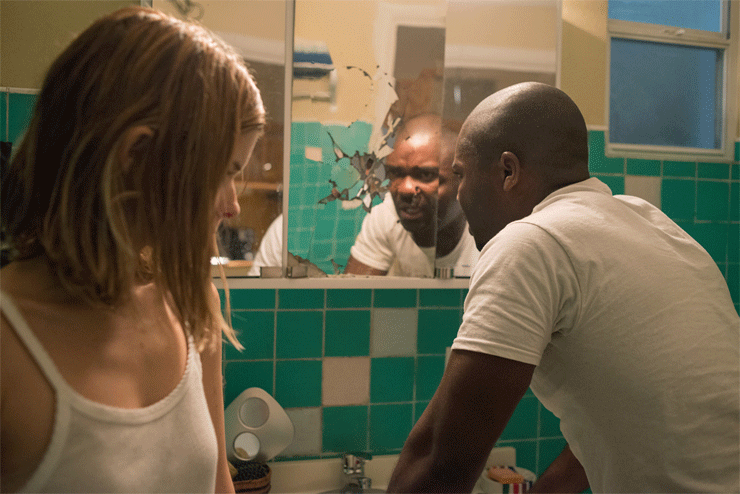
Kate Mara and David Oyelowo in a scene from Captive.
The film depicts, with unblinking clarity, Nichols' killing spree while escaping from the Fulton County Courthouse, which left a trail of bodies, including Judge Rowland Barnes and court reporter Julie Ann Brandau. Oyelowo says he wanted to ensure he, director Jerry Jameson and screenwriter Brian Bird refrained from depicting Nichols in any way that would glamorize his actions. “It was a very real danger that you have a guy, ex-football player, he was a big guy … [who] on that day wore a suit with no shirt on, he's got two guns, you know, running across the street,” he says. “These are cinematic images we associate with the hero in a movie. You know, there's the badass action dude, and the thing we really had to work harder at was to not glorify it. [We tried to] make it feel as coldblooded as it was, make him like the monster he was on that day, and then have something about his interaction with Ashley Smith bring out his humanity.”
Nichols' ruthless behavior, his initial disregard for human life before he crossed paths with Smith, raises the question of whether he bought into what Oyelowo coined a “minority mentality” during an NPR interview, something the actor was exposed to when he was accused of assimilating too much into Anglo culture while at school. “There's a story his mother told me which, I think, more recently hints at what happened in him. While he was in jail awaiting trial, he was in a cell with predominantly African-American males. They were all shackled together,” he says. “An incident took place while they were all pepper-sprayed, and he said that in that moment, he felt what it must have felt like to be in a slave ship, and that was a moment in which something in him snapped, and he didn't stop until four people were dead.”
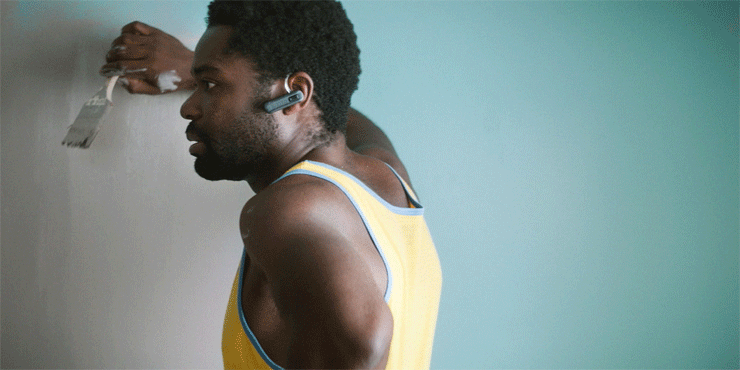
David Oyelowo in a scene from Nightingale.
One of the film's most memorable scenes shows Nichols, who's taken Smith hostage inside her own apartment, demanding that she take some of the meth that she's just given him. Her inner struggle as she forces herself to disobey her armed captor, even though doing so meant risking being shot on the spot, makes one wonder what Oyelowo would have done in her place. “I've never taken drugs in my life. I can't tell you I wouldn't have taken the meth,” he says. “It's kind of extraordinary that this woman who had been a slave to that drug in many ways, for many years … something about that moment, she felt that God took over Brian's body and said, 'Are you going to choose life or are you going to choose death?' She was looking down the barrel of a gun before she made that choice, so I am so blown away by her bravery and her ability to show him compassion.”
He reflects on the question a little longer. “She read The Purpose Driven Life to him. She made pancakes for him. I can tell you for a fact that I would not have made pancakes for Brian Nichols,” he says.
Oyelowo, himself a devout Christian, reveals he had read – and had been impressed by – Warren's book long before he became associated with Captive. “The thing that struck me about that book was, it was basically a book saying, 'God's purpose for your life far transcends the purpose that you foresee for yourself,' and I was very inspired by that,'” he says. “It really was a liberating notion, and that's why I was so inspired by this story.”
While doing research for both Captive and Nightingale, Oyelowo spoke with a clinical psychologist, something he says was important to arrive at the root of his characters' pathology. In Nichols' case, however, his homicidal behavior wasn't as easy to categorize. “There is still black spot over how a guy who was making six figures, was educated – he wasn't some street urchin who was deprived and has a litany of criminal activity. It's still a head-scratcher as to why he did what he did,” he says.
Captive ends with Nichols being taken into custody after he allows Smith to leave her apartment to go see her daughter. The imagery of this arrest, during which not a single shot was fired, inevitably triggers images of more recent police violence resulting in the violent deaths of African-American men. I remark to Oyelowo that watching the outcome of the 2005 incident as depicted in Captive feels like witnessing something from a long-ago era, suggesting it's probably not likely Nichols would have made it out of Smith's apartment complex alive if the hostage situation had happened in 2015. (Nichols is currently serving multiple life sentences with no chance of parole.)
“In my opinion, nothing has changed. I think that the reason he wasn't killed is because Ashley Smith went to the cops, and they were floored by the fact that this man let her go,” he says, “and the fact that he let her go meant that they were able to connect with some degree of humanity he must have had in order to do that. I think the reason why black men are being cut down in the streets of America is because they are being dehumanized, so that when a cop encounters them, they don't see a human being. They see a threat.”
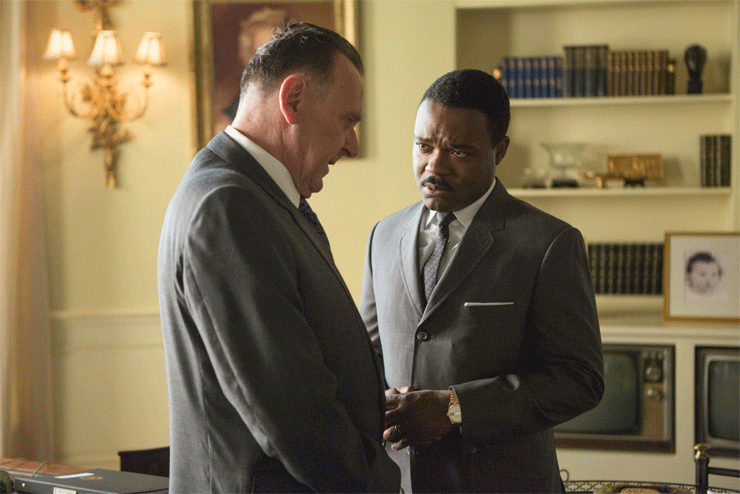
Tom Wilkinson and David Oyelowo in a scene from Selma.
Oyelowo adds, that sort of bloodshed was just as bad in 2005, arguing it only feels worse now because it's more widely documented. “Black people have been killed in this country for millennia. It's in the news more now, I think, because we have more cameras,” he says. “Social media means some of these stories can't be buried the same way they were in the past.”
When asked about the 180-degree turn of playing Nichols on the heels of embodying one of the most revered civil rights leaders of the 20th century, Oyelowo, who in 2001 became the first black actor to play an English king in a major production at the Royal Shakespeare Company, says he sees a similarity between Captive and Selma's narratives. “It was a big switch, but the commonality for me is that both stories are about light shining through the darkness,” he says. “In Selma, people died during that campaign. The injustice that was being meted out on black people in the South was real, and had been going on for hundreds of years … It took people of all colors, of all ages, to come together to declare it a wrong, for that to change. In [Captive], it took two very broken people having a human exchange for both their lives that were in a downward spiral to stop and take a turn for the better, a turn for hope, a turn for redemption.”
And it's by telling stories like that dark night Ashley Smith spent on the precipice between life and death, which she overcame by choosing to show kindness to the very man who could have killed her that, Oyelowo says, we can learn something about ourselves and the potential we never knew we had. “Ashley Smith said to me, on that day when Brian Nichols broke into her apartment, she had made so many bad choices … and yet this incident is the point beyond which she regained her life. Something about that night flipped a switch in her, and that is a very clear instance of someone having a purpose way bigger than they could have envisaged on that night, and here we are, talking about a film about her life, and I'm sure this is the last thing she anticipated, is us sitting around the table talking about her inspiring life.”
Captive is now showing in wide release.




